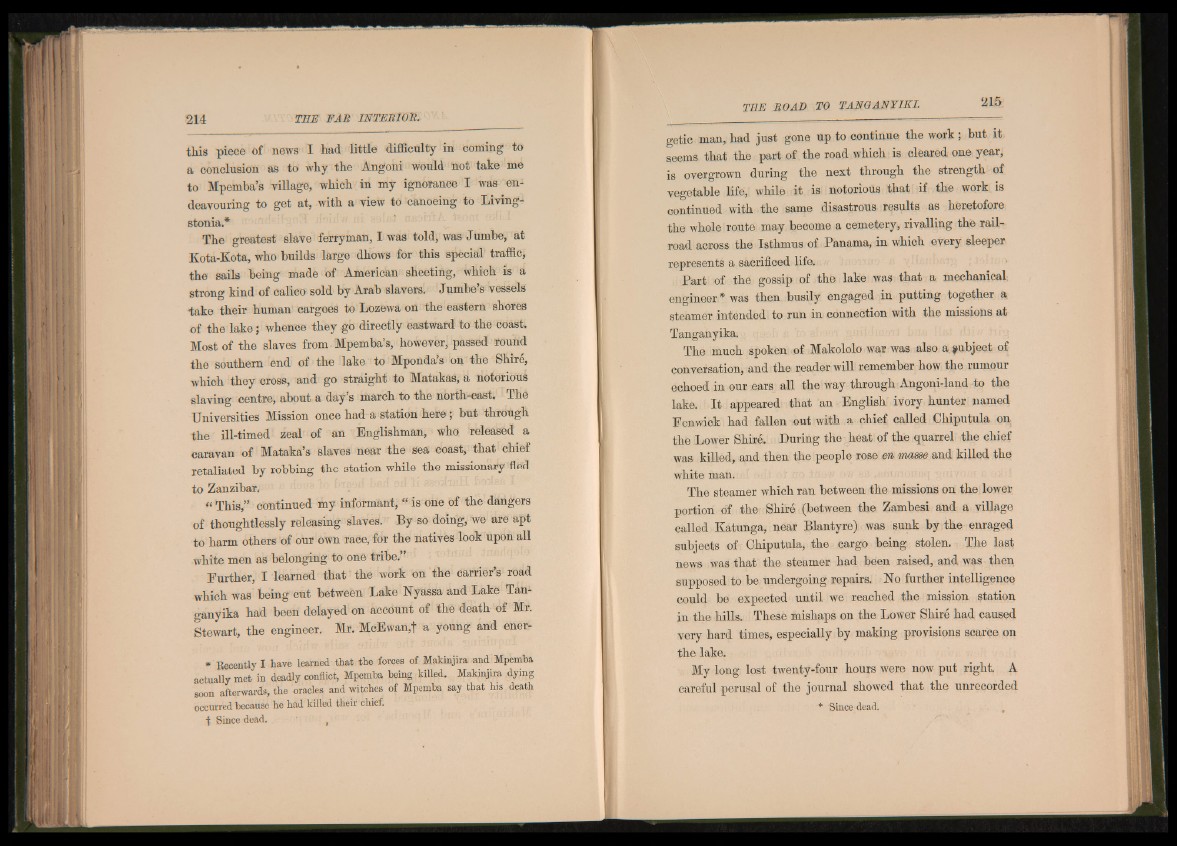
this piece of news I had little difficulty in coming to
a conclusion as to why the Angoni would not take me
to Mpemha’s village, which in my ignorance I was endeavouring
to get at, with a view to canoeing to Living-
stonia.*
The greatest slave ferryman, I was told, was Jurnbe, at
Kota-Kota, who builds large dhows for this special traffic,
the sails being made of American sheeting, which is a
strong kind of calico sold by Arab slavers. Jumbe’s vessels
take their human cargoes to Lozewa on the eastern shores
of the lake ; whence they go directly eastward to the coast.
Most of the slaves from Mpemba’s, however, passed round
the southern end of the lake to Mponda s on the Shire,
which they cross, and go straight to Matakas, a notorious
slaving centre, about a day’s march to the north-east. The
Universities Mission once had a station here ; but through
the ill-timed zeal of an Englishman, who released a
caravan of Mataka’s slaves near the sea coast, that chief
retaliated by robbing the station while the missionary fled
to Zanzibar,
“ This,” continued my informant, “ is one of the dangers
of thoughtlessly releasing slaves. By so doing, wë are apt
to harm others of our own race, for the natives look upon all
white men as belonging to one tribe.”
Further, I learned that the work on the carriers road
which was being cut between Lake Nyassa and Lake Tanganyika
had been delayed on account of the death of Mr.
Stewart, the engineer. Mr. McEwan,f a young and ener*
Recently I have learned that the forces of Makinjira and Mpemba
actually met in deadly conflict, Mpemba being killed. Makinjira dying
soon afterwards, the oracles and witches of Mpemba say that his death
occurred because he had killed their chief.
t Since dead. t
getic man, had just gone up to continue the work ; but it
seems that the part of the road whieh is cleared one year,
is overgrown during the next through the strength of
vegetable life, while it is notorious that if the work is
continued with the same disastrous results as heretofore
the whole route may become a cemetery, rivalling thè railroad
across the Isthmus of Panama, in which every sleeper
represents a sacrificed life.
Part of the gossip of the lake was that a mechanical;
engineer* was then busily engaged in putting together a
steamer intended to run in connection with the missions a t
Tanganyika.
The much spoken of Makololo war was also a.?ubject of
conversation, and the reader will remember how the rumour
echoed in our ears all the way through Angoni-land to the
lake. I t , appeared that an English ivory hunter named
Fenwick had fallen out with a chief called Chiputula on
the Lower Shiré. During the heat of the quarrel the chief
was killed, and then the people rose en masse and killed the
white man.
The steamer which ran between the missions on the lower
portion of the Shiré (between the Zambesi and a village
called Katunga, near Blantvre) was sunk by the enraged
subjects of Chiputula, the cargo being stolen. The last
news was that the steamer had been raised, and was then
supposed to be undergoing repairs. No further intelligence
could be expected until we reached the mission station
in the hills. These mishaps on the Lower Shiré had caused
very hard times, especially by making provisions scarce on
the lake.
My long lost twenty-four hours were now put right. A
careful perusal of the journal showed that the unrecorded
* Since dead.